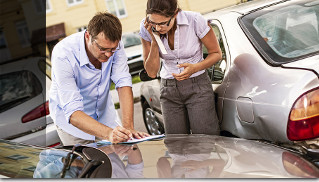 No one wants to have a motor vehicle accident but it’s almost a fact of life that you are going to have one at some point. As the old saying goes, “it’s not a matter of if, it’s a matter of when!” Hopefully, you never have a serious accident but it’s a good idea to be prepared for any accidents before they occur. Here’s a few things for you to consider so when the time comes, you are as prepared as you can possibly be. Some of the items you should keep in your car:
No one wants to have a motor vehicle accident but it’s almost a fact of life that you are going to have one at some point. As the old saying goes, “it’s not a matter of if, it’s a matter of when!” Hopefully, you never have a serious accident but it’s a good idea to be prepared for any accidents before they occur. Here’s a few things for you to consider so when the time comes, you are as prepared as you can possibly be. Some of the items you should keep in your car:
1) Pen and Small Notepad: To record insurance information and take notes at the scene 2) First-Aid Kit: Will allow you to tend to small cuts, bruises or bumps 3) Cell Phones: OK, you don’t actually keep one of these in your car but it’s good to have a cellphone on you so you can take pictures.
Here is what to do once an accident has happened: 1. Move your car. As soon as you can, move your vehicle to a safe area to prevent it from being hit by other vehicles. It’s tempting to think that since an accident occurred that the “evidence should be preserved” and nothing should get moved. The reality, however, is that you want to reduce the risk of another accident and move your car off to where it is safe.
2. Throw on your hazard lights. The switch for your hazard lights (emergency flashers) is usually located near your steering column, or on the dash. It often is a small orange or red button with a triangular icon on it. Put these on immediately to signal to everyone that they should pay attention to the vehicle because something is wrong.
3. Dial 911 immediately. Whenever you have an accident, it is very important to have the local police come and take care of things. That’s their job and they know what to do. When the police do arrive they will take over. They will document the accident, take care of any issues and control traffic. 4. Exit your car, if it seems safe. Make sure that all is clear and check to see if anybody has been hurt. Check the other vehicles involved and see how everyone else is doing. If things aren’t well for others, you can alert the police when they arrive.
5. Start taking pictures. This may sound obnoxious but the more pictures you can take, the better it is. These pictures can help the police when the investigate and your insurance company will likely want to see them. 5. Contact your insurance company. If you have the time, you may want to call your insurance agent. You may be able to start filing a claim online, although this is probably best done when you are back home.
Article Courtesy of: Urse Chrysler Dodge Jeep
Image Source: Google